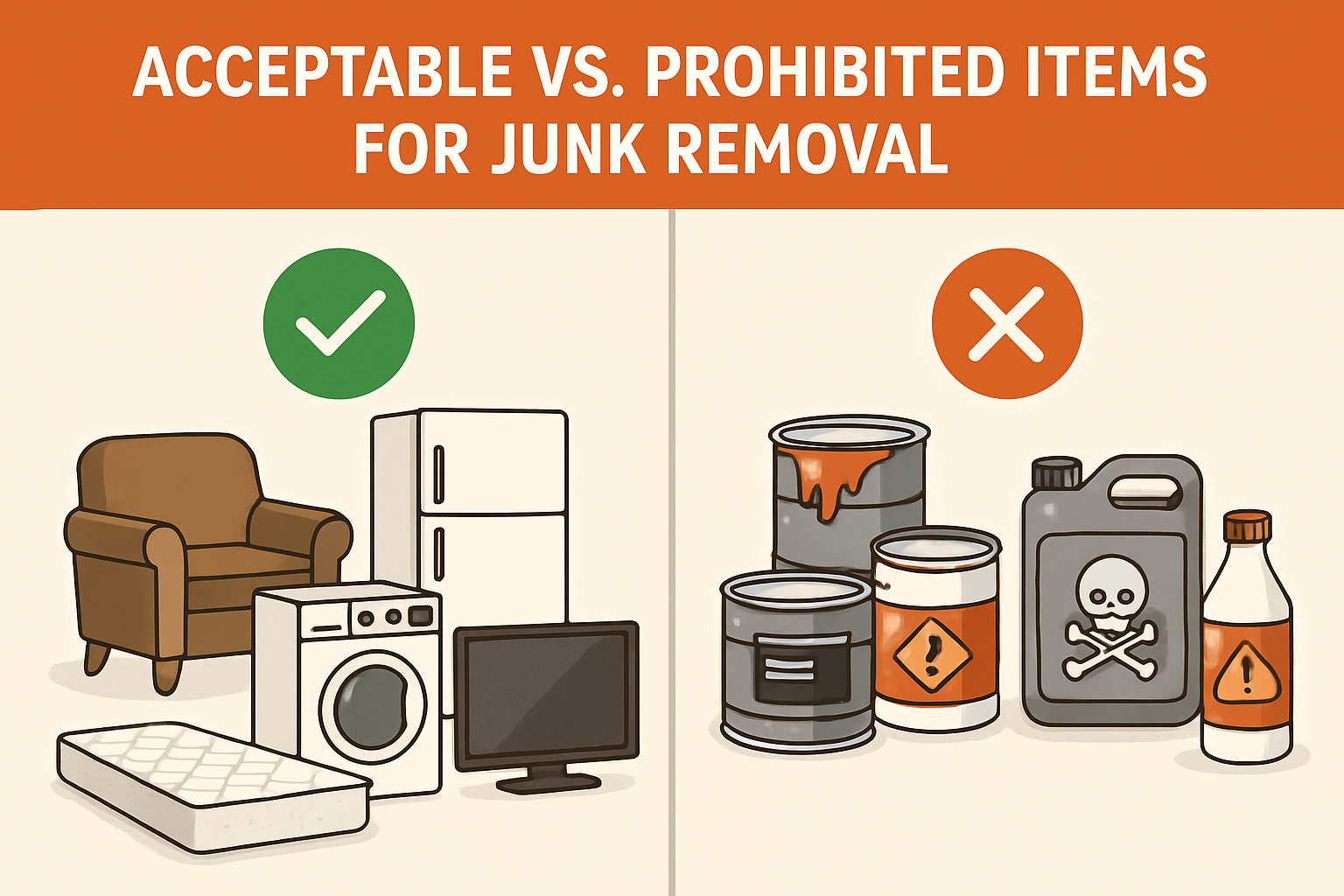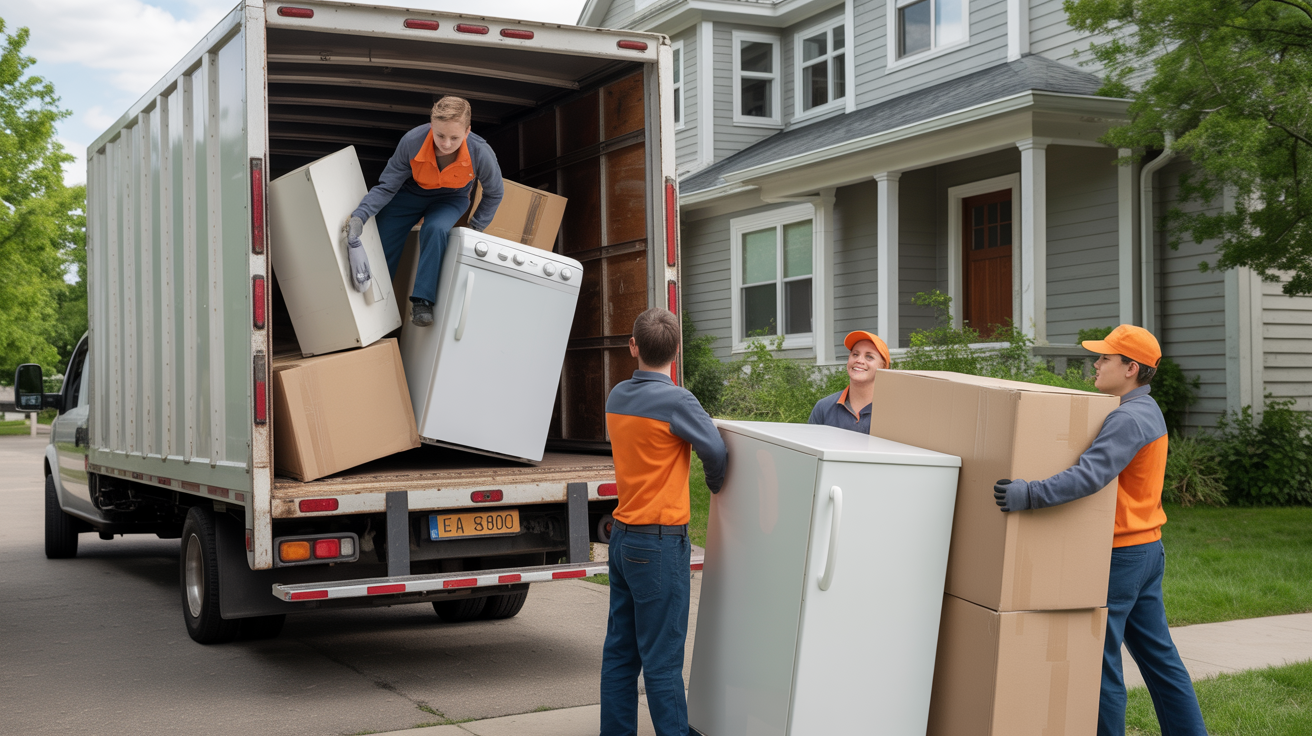What Items Can and Can't Be Removed?
Your complete guide to junk removal items in Minneapolis

Understanding what items can and cannot be removed by junk removal services in Minneapolis is crucial for planning your cleanout project. While most household and commercial items are acceptable, certain materials require special handling or cannot be removed for safety and legal reasons.
Items We ALWAYS Accept
These common household and commercial items are always welcome in our residential junk removal services:
Furniture
- Sofas, chairs, and recliners
- Tables (dining, coffee, end tables)
- Beds and bed frames
- Dressers and armoires
- Bookcases and shelving units
- Desks and office furniture
- Outdoor patio furniture
- Exercise equipment and gym machines
Appliances (Most Types)
- Refrigerators and freezers
- Washers and dryers
- Dishwashers
- Stoves and ovens
- Microwaves
- Air conditioners
- Water heaters
- Small kitchen appliances
Electronics
- Televisions (all sizes)
- Computer monitors and towers
- Laptops and tablets
- Printers and scanners
- Stereo systems and speakers
- VCRs, DVD players, game consoles
- Cell phones and small electronics
General Household Items
- Mattresses and box springs
- Carpets and rugs
- Books and magazines
- Clothing and textiles
- Toys and sporting goods
- Kitchenware and dishes
- Decorative items and artwork
- Storage boxes and containers
Yard and Outdoor Items
- Lawn mowers (gas drained)
- Garden tools and equipment
- Outdoor furniture and grills
- Swing sets and playground equipment
- Sheds (disassembled)
- Landscaping materials
- Patio umbrellas and awnings

Most household items are easily accepted by professional junk removal services
Items Requiring Special Handling
These items are acceptable but may require additional fees or special arrangements:
Large Appliances
- Refrigerators/Freezers: Require EPA-certified freon removal ($25-$50 fee)
- Air Conditioners: Same freon removal requirements
- Water Heaters: Gas lines must be disconnected by licensed professional
Construction Materials
- Drywall: Large quantities accepted with advance notice
- Flooring: Carpet, hardwood, tile (non-asbestos)
- Fixtures: Cabinets, doors, windows
- Roofing materials: Shingles (non-asbestos), gutters
Heavy or Bulky Items
- Hot tubs/Spas: Require special equipment and may incur additional fees
- Piano removal: Additional labor charges apply
- Safes: Depending on size and weight
- Pool tables: Professional disassembly recommended
Items We CANNOT Remove
For safety, legal, and environmental reasons, these items cannot be accepted by junk removal services:
Hazardous Materials
- Paint and paint thinners
- Motor oil and automotive fluids
- Gasoline and kerosene
- Propane tanks (all sizes)
- Car batteries
- Pesticides and herbicides
- Pool chemicals
- Cleaning solvents
- Asbestos materials
- Medical waste
Dangerous or Regulated Items
- Firearms and ammunition
- Explosives
- Radioactive materials
- Biological waste
- Industrial chemicals
Certain Automotive Items
- Vehicles (cars, boats, RVs)
- Tires (some companies accept with fees)
- Fuel tanks
- Catalytic converters
Other Prohibited Items
- Wet or moldy materials
- Food waste
- Human/animal remains
- Contaminated soil
- Raw sewage
Special Disposal Guidelines for Minneapolis
Electronics Recycling
Minnesota has strict electronics recycling laws. Our specialty junk removal service ensures all electronics are properly recycled at certified facilities, including:
- Proper data destruction for computers
- Mercury removal from old monitors
- Component separation for recycling
- Certificate of recycling provided
Appliance Disposal
Large appliances require special handling in Minneapolis:
- Freon-containing appliances: Must be handled by EPA-certified technicians
- Energy Star rebates: We can help with utility rebate programs
- Recycling programs: Metal components are recycled properly
Mattress Recycling
Minneapolis encourages mattress recycling. We partner with local facilities to:
- Separate springs, foam, and fabric
- Recycle metal springs
- Repurpose foam and fabric materials
- Keep mattresses out of landfills
Where Prohibited Items Should Go
Hazardous Waste
Hennepin County Hazardous Waste Facilities:
- Brooklyn Park Environmental Center
- Bloomington Environmental Center
- Minnetonka Drop-Off Facility
These facilities accept paint, chemicals, batteries, and other hazardous materials for proper disposal.
Automotive Items
- Auto parts stores: Accept batteries, oil, and filters
- Tire shops: Most accept old tires for recycling
- Scrap yards: Accept metal automotive parts
Paint Disposal
- Paint retailers: Many accept leftover paint
- County facilities: Hazardous waste centers
- Paint recycling programs: Check manufacturer programs
Preparing Items for Removal
General Preparation
- Empty all containers: Remove personal items from furniture
- Separate prohibited items: Set aside hazardous materials
- Group similar items: Makes pricing and removal easier
- Clear pathways: Ensure easy access to items
Appliance Preparation
- Refrigerators: Remove all food and defrost
- Washers: Disconnect water lines
- Gas appliances: Have utilities disconnected professionally
- Electronics: Remove batteries and cords when possible
Special Items
- Computers: Back up data and perform factory reset
- Yard equipment: Drain all fluids (gas, oil)
- Furniture: Disassemble if possible to reduce volume
Donation vs. Disposal
Before disposing of items, consider whether they could be donated. We work with local Minneapolis charities to ensure usable items find new homes:
Items Perfect for Donation
- Furniture in good condition
- Working electronics
- Clothing and textiles
- Books and educational materials
- Toys and sporting goods
- Household goods and kitchenware
Local Minneapolis Donation Partners
- Goodwill Twin Cities
- Salvation Army
- Habitat for Humanity ReStore
- Local churches and community centers
- Women's shelters and transitional housing
Environmental Benefits
Proper item handling benefits the Minneapolis environment:
- 85% of our items are donated or recycled
- Metal recycling reduces mining needs
- Electronic recycling prevents toxic materials from landfills
- Donation programs extend item lifecycles
- Proper disposal protects local water supplies
Cost Considerations
Standard Items
Most household items are included in standard junk removal pricing based on volume.
Special Fee Items
- Appliances with freon: $25-$50 additional
- Mattresses: $25-$40 each (recycling fee)
- Tires: $5-$15 each (where accepted)
- Electronics: Sometimes included, may have $10-$30 fee
- Heavy items: May require additional labor charges
When in Doubt, Ask
If you're unsure whether an item can be removed, don't hesitate to ask. Our Minneapolis junk removal team can:
- Assess unusual or questionable items
- Suggest proper disposal alternatives
- Provide guidance on preparation
- Offer referrals for specialized disposal
Planning Your Cleanout
For effective cleanout planning:
- Sort items first: Separate acceptable from prohibited items
- Handle hazardous materials separately: Take to proper facilities first
- Consider donation opportunities: Set aside usable items
- Group similar items: Makes removal more efficient
- Prepare access: Clear pathways and remove obstacles
Commercial Cleanout Considerations
For commercial cleanouts in Minneapolis, additional considerations apply:
- Office electronics: May require data destruction certificates
- Industrial equipment: May need specialized removal
- Retail fixtures: Often can be donated or resold
- Restaurant equipment: Special grease disposal requirements
- Medical offices: Regulated waste requires special handling
Staying Compliant
Working with a professional Minneapolis junk removal service ensures:
- Compliance with all local disposal regulations
- Proper handling of regulated materials
- Environmental responsibility
- Legal protection from improper disposal
- Peace of mind knowing items are handled correctly
Understanding what can and cannot be removed helps you plan your cleanout project effectively. When you're ready to clear your space, our professional team will handle the sorting, removal, and proper disposal of all acceptable items while guiding you toward proper alternatives for prohibited materials.
